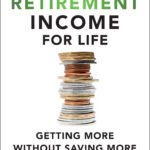 Once they move from the wealth accumulation phase to “decumulation” retirees and near-retirees start to focus on how to boost Retirement Income.
Once they move from the wealth accumulation phase to “decumulation” retirees and near-retirees start to focus on how to boost Retirement Income.
The latest instalment of my MoneySense Retired Money column looks at five “enhancements” to do this, all contained in Fred Vettese’s about-to-be-published book, Retirement Income for Life, subtitled Getting More Without Saving More. You can find the full column by clicking on this highlighted headline: A Guide to Having Retirement Income for Life.
You’ll be seeing various reviews of this book as it becomes available online late in February and likely in bookstores by early March. I predict it will be a bestseller since it taps the huge market of baby boomers turning 65 (1,100 every day!): including author Fred Vettese and even Yours Truly in a few months time.
That’s because a lot of people need help in generating a pension-like income from savings, typically RRSPs, group RRSPs and Defined Contribution plans, TFSAs, non-registered investments and the like. In other words, anybody who doesn’t enjoy a guaranteed-for-life Defined Benefit pension plan, of the type that are still common in the public sector but becoming rare in the private sector.
The core of the book are the five “enhancements” Vettese has identified that help to ensure that those seeking to pensionize their nest eggs (to paraphrase the title of Moshe Milevsky’s book that covers some of this ground) don’t outlive their money. Vettese says many of these concepts are current in the academic literature but have been slow to migrate to the mainstream, in part because few of these “enhancements” will be welcomed by the typical commission-compensated financial advisor. That in itself will make this book controversial.
Each of these “enhancements” get a whole chapter but in a nutshell they are:
1.) Enhancement 1: Reducing Fees
By moving from high-fee mutual funds or similar vehicles to low-cost ETFs (exchange-traded funds), Vettese explains how investment fees can be cut from 1.5 to 3% to as little as 0.5% a year, all of which goes directly to boosting retirement income flows. One of his takeaways is that “Tangible evidence of added value from active management is hard to find.”
 2.) Enhancement 2: Deferring CPP Pension
2.) Enhancement 2: Deferring CPP Pension
We’ve covered the topic of deferring CPP to age 70 frequently in various articles, some of which can be found here on the Hub’s search engine. Even so, very few Canadians opt to wait till age 70 to collect the Canada Pension Plan. Because CPP is a valuable inflation-indexed guaranteed for life instrument — in effect, an annuity that you can never outlive — Vettese argues for deferral, although he (like me) is fine with taking Old Age Security as soon as it’s available at age 65. He argues that for someone who contributed to CPP until age 65, they can boost their CPP income by almost 50% by waiting till 70 to collect. “You are essentially transferring some of your investment risk and longevity risk back to the government, and you are doing so at zero cost.”
3.) Enhancement 3: Buying an Annuity
As I note in the MoneySense column, Vettese makes the case for partly annuitizing a nest egg as soon as you retire at 65: to the tune of 30% of your RRIF assets. This Vettese sees as a hedge against future investment returns that could be “truly bad.” He concedes there may be an opportunity cost to buying an annuity: “You will not have as big a windfall within your RRIF if investments do really well, although you will still have more income than you had expected.”
4.) Enhancement 4: A Dynamic Spending Approach
The fourth enhancement Vettese argue may be the “most important of all.” It is a strategy designed to let retirees spend more if their financial situation improves but to batten down the hatches in spend less if financial circumstances deteriorate.
5.) Enhancement 5: The “nuclear option” of a Reverse Mortgage
This is an “if all else fails” enhancement that Vettese (and I) hope will not prove necessary. For many Canadians with substantial home equity, it’s nice to know that in a worst-case scenario, your home equity can be tapped. But, Vettese warns, “it should only be used to provide necessary income, not to enhance one’s lifestyle.” He also says it should not be considered until age 75. He notes that a reverse mortgage typically involves about 180 basis points higher than a HELOC would charge.



Good advice Jonathan. Food for thought for sure.
Interesting article Jonathan; does the book cover any specifics for decumulating an RRSP when one spouse has a DB pension plan?
Good summary of the book. Excellent read but specifics are missing. I believe in low cost ETF but how do you convert all your RRSP porfolio (mutual funds, bonds…) into an ETF porfolio without incurring a huge cost. What about a single investor who wants to get an annuity. What about annuitizing before 65? The book raise a lot of question.